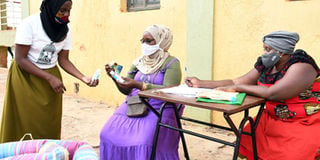The cost of keeping pregnant girls in school

A learner declares her property to school administrators while reporting to school post-lockdown. PHOTO/STEPHEN OTAGE
What you need to know:
- At least 2,730 teenage girls got pregnant during the first three months in the lockdown, that according to Ms Florence Nakiwala, the Youth and Children’s Affairs minister.
- Getting pregnant while still in school is not only an emotionally traumatising experience but it can also be financially costly.
Getting pregnant while still in school is not only an emotionally traumatising experience but it can also be financially costly. Currently, there are thousands of pregnant school girls. What can be done to enable them continue with their studies?Roland D Nasasirawrites.
Girls as young as 15 years are grappling with the difficulties that come with being a mother. The usual maternal challenges for these teen-mothers-to-be are compounded by the fact that they will be expected to go back to the life of ordinary school girls.
According to Florence Nakiwala, the Youth and Children’s Affairs minister, at least 2,730 teenage girls got pregnant during the first three months in the lockdown.
In Mbarara District, alone, 1,363 teenage pregnancies were registered between January and August, according to district officials. And the numbers have since grown.
Nakiwala said some girls are lured into early sex by men because they lack basic needs.
“It is a result of probably lack of school, but we discovered that school is not safe either. They were getting pregnant at school and they are equally getting pregnant at home. The priorities in a home change. Once you provide a meal, you do not provide sanitary towels,” she says.
The effects of these pregnancies are economically and emotionally costly to the families, the girls and the boys involved. For instance, it was recently reported that a Senior One student of Kyotera Town Academy, a secondary school in Rakai District had committed suicide by ingesting a pesticide after allegedly impregnating a 15-year-old girl with whom he had allegedly been in a relationship.
The story added that the girl’s parents confronted the boy’s parents at their home accusing their son of impregnating their daughter. They demanded that the boy either marries the girl or faces the consequences of the law.
According to recent guidelines from the Ministry of Education, a boy who makes a girl pregnant in school will have to leave and only return after the girl has given birth and the girl will also be required to stay away from school until delivery.
This is one of the consequences of the law the boy was afraid of since he said he still wanted to continue with his studies. The girl’s parents asked for Shs100,000 they said was to take care of their pregnant daughter, in the meantime. The boy denied being in a relationship with the girl, whom he later accused of having other boyfriends.
This is just one of the many far reaching effects of teenage pregnancies sparked by the Covid-19 induced lockdown. Even if schools were reopened on October 15 for candidate classes, however, according to Elliot Orizarwa, the executive Director of Women and Girl Child Development Association (WEGCDA), many girls are likely to miss out of school because of pregnancies.
“For Uganda to achieve Sustainable Development Goals four and five of quality education and gender equality, there is need to ensure that every girl, whether pregnant or not returns to a safe school environment and is retained in school,” Orizarwa says.
What it takes to keep a pregnant girl in school
Peace Kyamuleku is the Director of Excel Millennium High School at Kyengera. She has supported pregnant girls in her school in the past and agrees that pregnant school girls especially those who conceived during the five months of lockdown should be given a chance to complete their studies.
Kyamuleku advises that the school administrator should give guidance on how these girls should be treated and protect them from stigmatisation.
“There should be someone in the kitchen who regularly prepares special meals for pregnant school girls in addition to the normal school food. But as a parent or guardian of this pregnant girl, besides school fees, kindly agree to give financial support to the girl to buy what they want from the canteen.

Joyce Akello, a community education officer from Irise Institute East Africa giving out free sanitary towels after educating school girls of St. Stephen’s Church of Uganda, about the adolescent reproductive health recently. Despite the lockdown restrictions, the NGO had to devise means of reaching girls from different schools to sensitize them about how to avoid pregnancies because many of them got pregnant during the lock down. PHOTO/ STEPHEN OTAGE
With pregnancy, there are always cravings for many different foodstuff. This kind of support helps them overcome the stigma they could probably be subjected to and helps them fit and remain in the school environment freely,” Kyamuleku advises.
The cost in figures
According to Kyamuleku, the cost of a school uniform for a pregnant teenage school girl would be Shs50,000 while the cost of each antenatal care visit is Shs25,000 per visit. This makes it Shs100,000 for the four visits they are supposed to go for.
This importance of proper nutrition during pregnancy cannot be over stressed. Therefore, for the expecting mother there is need to supplement the food served by the school. What the girl eats will depend on her economic capacity.
“There are those who would like to eat a boiled or fried egg per day or even a samosa from the school canteen which are not so costly. However, if they are day scholars, the parents or guardians can give them daily or weekly pocket money depending on the cost of what they want to eat or even pack it from home.
If they are in boarding school, the parents can give them slightly more or twice the pocket money they have been giving them,” she notes.
Kyamuleku urges that the girls should be supervised vigilantly since some girls might be tempted to eat unhealthily in order to avoid gaining weight which will affect both the baby and mother’s health.
“Most pregnant teenage girls normally mind what they eat because they do not want to gain weight. They want to eat a balanced diet that does not subject them to weight gain,” Kyamuleku says.
Shrouded in secrecy
Approximately three weeks since schools were reopened, Kyamuleku says there have not been any pregnant teenage girls who have reported to school. Some girls have not reported to school but Kyamuleku cannot tag it to pregnancy. It could perhaps be the same in other schools countrywide.
“It could be due to other challenging factors such as finances but I cannot rule out pregnancy. These (pregnancy) are issues that will not be talked about by the girl or her parents unless I meet the girl and see them with signs of pregnancy or when you hear about it,” she adds.
Pregnancy is not like a disease where people need to distance from each other. There will be no stigma if there is sensitisation and understanding at school and home.
“When the pregnancy is still young, the girl will still fit in her uniform but as it grows and it is seen and she can no longer hide it, the stigma sets in. These are things to look out for as a school. Is the girl dressed comfortably?
Can she fit in society or the school environment? Not everyone walks around to see if you are pregnant. This allows the girl to concentrate like any other student,” she notes.
She advises school administrators to talk to the parents or guardians about providing a bigger uniform for the pregnant girl to make them feel part of the school.
“You do not want to see them in tight skirts or dresses or being in a sweater all the time as some of the ways girls use to hide the pregnancy, which in the long run make them uncomfortable. Schools should not be sources of stigma especially and should enable pregnant girls to complete their education,” Kyamuleku advises.

Students report to school. The ministry recommended that a school boy who gets a girl pregnant should also stay at home until the girl has delivered. PHOTO/FILE
Males in the picture
According to Kyamuleku, perpetrators of teenage pregnancy are not only boys but could be any male figure. Kyamuleku observes that the boys could be fellow teenagers who are also unaware of the dangers of engaging in unprotected and premarital sex.
“This is where we say the pregnancy was a mistake. Sometimes it is someone older at home or a male in the girl’s neighbourhood who deceived her with money. The male who is older than the girl is where the problem is because the girl may fear to pin him down,” Kyamuleku says.
Also, sometimes this male is already married and has a family and even if the girl mentions them, it may not help her because the man will deny having any relationship with the girl. There is the third category of male perpetrators who commit incest against their female relatives, something Orizarwa and Kyamuleku suspect could have happened on a wider scale during the lockdown.
“With incest, the girl will bring conflict in the family and no one will hold the perpetrator (male) accountable. There were situations where girls were sold off for sex even by their parents. The issues that we thought were rarely happening in communities came out openly during coronavirus pandemic times and it became the order of the day,” Kyamuleku observes.
Measures
Not every school girl who is pregnant actually knows that they are. As such, Kyamuleku recommends inviting a school nurse to carry out pregnancy tests at the start of every term.
“As you do this, tell girls why the school is doing it because you do not want parents to accuse the school when a girl conceals a pregnancy at home and reports to school with it,” she cautions.
The Covid-19 pandemic has resurrected issues such as the too much freedom girls have in their homes because some parents or guardians are busy elsewhere. There are girls who help parents run some businesses such as bars which exposes them to risk of entering into relationships with clients and getting impregnated by them.
While some schools will not allow pregnant teenage girls back in school, parents such as Beatrice Natukunda of Nansana opine that school authorities should instead devise other ways of keeping these girls in school.
“You can think of developing separate classes for those that have returned to school pregnant. It sounds an alarm to those that have not conceived not to engage in sexual intercourse,” Natukunda says.
For those that are found pregnant during pregnancy tests, Kyamuleku recommends subjecting them to specialised counselling different from what other girls receive.
“As a school, you do not want to embarrass the girls. You also have to confidentially invite the pregnant girl with a few of those that are not pregnant so that the rest do not tell the difference. Talk to her and ask what happened and who could be responsible. Many are sometimes shocked that they are pregnant.
When they reveal the information, call their parents to discuss the matter without criticising the girl. It becomes easier for her to become comfortable within school,” Kyamuleku concludes.
According to the United Nations Population Fund (UNFPA) document on teenage pregnancy in Uganda during and post Covid-19 lockdown, Eastern Uganda (Busoga) has the highest reported cases with Luuka district alone reporting more than 600 cases, while the Uganda Police report registered 4,442 cases of defilement between and April 2020, a period under which the country was under a lockdown.
In a research made by Africhild, Timothy Opobo, the executive Director of the organisation says Pader district registered 902 cases of teenage pregnancy while Bundibugyo registered 201 cases, respectively.



